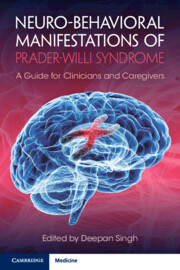Book contents
- Neuro-behavioral Manifestations of Prader-Willi Syndrome
- Neuro-behavioral Manifestations of Prader-Willi Syndrome
- Copyright page
- Dedication
- Contents
- Contributors
- Preface
- Acknowledgments
- Chapter 1 Knowing Your Patient
- Chapter 2 Caregiver Burden in Prader-Willi Syndrome
- Chapter 3 Establishing a Relationship with a Mental Healthcare Provider
- Chapter 4 Sleep Disorders in Prader-Willi Syndrome
- Chapter 5 Autism in Prader-Willi Syndrome
- Chapter 6 Anxiety in Prader-Willi Syndrome
- Chapter 7 Picking, Hoarding, and Elopement in Prader-Willi Syndrome
- Chapter 8 Attention-Deficit/Hyperactivity Disorder in Prader-Willi Syndrome
- Chapter 9 Agitation and Aggression in Prader-Willi Syndrome
- Chapter 10 Mood Disorders in Prader-Willi Syndrome
- Chapter 11 Psychotic Disorders in Prader-Willi Syndrome
- Chapter 12 Psychopharmacology in Prader-Willi Syndrome
- Chapter 13 A Caregiver’s Perspective
- Chapter 14 The Neurobiology of Prader-Willi Syndrome
- Chapter 15 Final Reflections on the Neuro-behavioral Manifestations of Prader-Willi Syndrome
- Index
- References
Chapter 11 - Psychotic Disorders in Prader-Willi Syndrome
Published online by Cambridge University Press: 26 May 2022
- Neuro-behavioral Manifestations of Prader-Willi Syndrome
- Neuro-behavioral Manifestations of Prader-Willi Syndrome
- Copyright page
- Dedication
- Contents
- Contributors
- Preface
- Acknowledgments
- Chapter 1 Knowing Your Patient
- Chapter 2 Caregiver Burden in Prader-Willi Syndrome
- Chapter 3 Establishing a Relationship with a Mental Healthcare Provider
- Chapter 4 Sleep Disorders in Prader-Willi Syndrome
- Chapter 5 Autism in Prader-Willi Syndrome
- Chapter 6 Anxiety in Prader-Willi Syndrome
- Chapter 7 Picking, Hoarding, and Elopement in Prader-Willi Syndrome
- Chapter 8 Attention-Deficit/Hyperactivity Disorder in Prader-Willi Syndrome
- Chapter 9 Agitation and Aggression in Prader-Willi Syndrome
- Chapter 10 Mood Disorders in Prader-Willi Syndrome
- Chapter 11 Psychotic Disorders in Prader-Willi Syndrome
- Chapter 12 Psychopharmacology in Prader-Willi Syndrome
- Chapter 13 A Caregiver’s Perspective
- Chapter 14 The Neurobiology of Prader-Willi Syndrome
- Chapter 15 Final Reflections on the Neuro-behavioral Manifestations of Prader-Willi Syndrome
- Index
- References
Summary
This chapter describes the phenomenon of psychosis and how it presents in patients with PWS. Characteristics of psychosis, including delusions, hallucinations, disorganized thinking, abnormal motor behavior, or negative symptoms are described. Although the classical presentation of schizophrenia, schizophreniform, and other schizoid disorders is uncommon in PWS, there are other less-recognized psychotic presentations that are explained in the text. Delirium, despite not being considered a psychotic disorder, is important to recognize due to its association with medications patients with PWS are prescribed. Cycloid psychosis is another phenomenon that, although not formally recognized in the DSM-5, is frequently seen in PWS. The sudden onset and cycling between normalcy and psychosis makes it difficult to diagnose for providers who are unfamiliar with it. We emphasize the need for immediate medical attention and treatment in the case of suspected psychosis. Some commonly used strategies for management are discussed. Continued monitoring by mental healthcare providers and need for maintenance treatment is discussed.
Keywords
- Type
- Chapter
- Information
- Neuro-behavioral Manifestations of Prader-Willi SyndromeA Guide for Clinicians and Caregivers, pp. 103 - 115Publisher: Cambridge University PressPrint publication year: 2022

